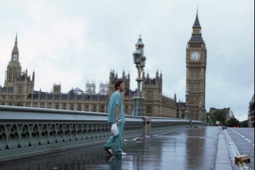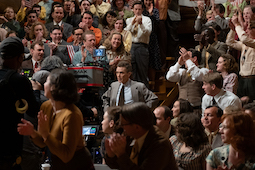
Just like you can't separate Arrakis from the Spice Melange, one cannot separate the Dune: Part Two experience from the music of Hans Zimmer. The composer's all-encompassing soundscapes eddy and flow, surge and recede in the manner of an Arrakis coriolis storm, engulfing the viewer with all manner of intriguing musical suggestion.
With Dune: Part Two, Zimmer completes the musical arc he started in 2021's Dune, for which he won an Oscar. Famously, Zimmer and director Denis Villeneuve have made the decision to ground much of the music through female vocals, implicitly suggesting that the secretive Bene Gesserit sisterhood are the driving force behind the story's account of messianic glory. The nuances of Zimmer's work become even more potent when presented in IMAX where the fully integrated sound threatens to heighten our perception in the manner of spice itself.
The vocal arrangements are paid off in the score for Dune: Part Two, as are the incessant tribal drums and other compelling stylistics that we've come to expect, and the composer introduces new ideas, too. Here are the seven best Zimmer soundtrack moments that take us to Arrakis and back.
POSSIBLE DUNE: PART TWO SPOILERS AHEAD
1. Water of Life
Zimmer's central Bene Gesserit vocal motif is corrupted and inverted for the pivotal sequence where Lady Jessica (Rebecca Ferguson) drinks the Water of Life to ascend to the role of Reverend Mother.
Disquieting, plaintive vocals, breathy flutes, distorted synths and choral glissando effects suggest how Lady Jessica's womanhood has leapt forward an evolutionary stage, transfiguring her from wife and mother (let's not forget, she's newly pregnant at the time) into something that transcends organic, fleshy reality. Zimmer's ability to communicate this complexity through subjective and suggestive tones cements his status as one of Hollywood's leading musical artists.
2. A Time of Quiet Between the Storms
Zimmer's new theme for the movie centres on the slow burn between incumbent messiah Paul Atreides (Timothée Chalamet) and his Fremen love Chani (Zendaya). As one would expect it's a beauty, evoking Zimmer's tender ethnic work on the likes of Beyond Rangoon, The Thin Red Line and The Last Samurai, particularly in its use of the Armenian duduk to harmonise the relationship between two children of very different worlds.
In fact, the track is more a development of Paul's human theme from the first Dune, and is an indication of how brilliant Zimmer is at building on his core musical ideas. The track is also a miniature narrative in and of itself, evolving from the haunting duduk arrangement into more grandiose synths as it alludes to Paul and Chani's increasingly complex and tormented future.
3. Worm Ride
Hans Zimmer not only materialises Shai-Hulud through his music, but he makes us feel its heft, awe and majesty. Hands up, who got chills amidst the IMAX bass-rattling intensity during this sequence? Evidently, the impact of Paul riding the worm owes a lot to the splendid sound design, all roaring, rushing winds and plosive sand effects, not to mention the astonishing visual point of view shots.
But Zimmer's music is the icing on the cake: much as his score replicates objective concete sounds throughout the movie, Zimmer's ultimate purpose is to conjure that sense of intangible emotion that transports us from being passive spectators into active participants in the world of the film. His music is both mysterious and utterly discernible, communicating the mystery of Paul as the kwisatz haderach while celebrating his apparent heroism. Alas, as we know, that heroism won't last...
4. Harkonnen Arena
Meldoy and harmony go out of the window in Zimmer's brutal depiction of the animalistic Harkonnens. Zimmer goes hard with the howling synths and off-kilter percussion, which suggest Zimmer's great electronic predecessor Vangelis at his most wildly experimental.
This track accompanies the introduction of the monstrous Feyd-Rautha (Austin Butler) and Zimmer's music makes it especially evident that the character is not out collecting for charity. The stark and uncomfortable nature of the score meshes beautifully with Villeneuve and Greig Fraser's remarkable monochrome perception of the Harkonnens' home world, Giedi Prime.
5. Never Lose Me
Paul and Chani's gorgeous love theme is reinstated here, albeit with a more urgent and tragic slant to it. Zimmer's attractive musical building blocks are also to be commended for their malleability: it only takes one slam of a bass drum or one discordant synth chord to transfigure something apparently peaceful and healing into something much more dangerous that portends a violent future lying ahead.
Much has been made as to Zendaya's interpretation of Chani. She plays it as much more of a concerned spectator who actively fears what Paul is becoming, which is slightly different from the book's emphasis. Zimmer's music emphasises this sense of anxiety to the hilt, as the music's sense of organic warmth is steadily crushed by mechanistic tones that imply Paul's inner turmoil and emotional change.
6. Only I Will Remain
The conclusion of Dune: Part Two is breathtaking in its sense of stark horror. In fact, we've been through so much up to this point that it's amazing we've got any more breath for the film to take. Credit Zimmer's music for much of that impact: as we approach the spine-chilling confluence of ecology, mysticism, imperialism, colonialism and politics, Zimmer's music coalesces all of its grand ideas to make the story's darkest and most ironic point about its alleged messiah.
In other words, Paul is a messiah, not a saviour, and Zimmer's juxtaposition of the Paul/Chani theme against the aural bombast is a brilliantly effective way of underlining all that has been lost on a moral level. As the central duduk/relationship theme becomes its own anthem of tragedy, Zimmer's pounding drums anticipate the onset of the Holy War that will engulf the entire universe. It's a fabulous example of how music can be used to encode our musical understanding of cinema.
7. Lisan al Gaib
Once again, a sense of dramatic musical irony is at the forefront, given that the final track on Zimmer's album comes from the Fremen term for messiah. In this end credits arrangement, Zimmer takes us on a dizzying whirlwind of the score's core ideas, from the growling Bene Gesserit theme to the Paul/Chani theme and the brutish material for the Harkonnens.
There's little sense of triumph in Zimmer's music, impressive though it is. After all, a sense of tonal heroism wouldn't serve the themes of the story. What there is a sense of a dense musical tapestry that has worked overtime to capture a sense of character, place and thematic development. Fingers crossed for all of this material to be further developed in Dune: Messiah, which Zimmer has confirmed he's already working on.
Want to experience Hans Zimmer's work again in context? Then click the link below to book your tickets for Dune: Part Two.











.jpg)
.jpg)

.jpg)
.png)



